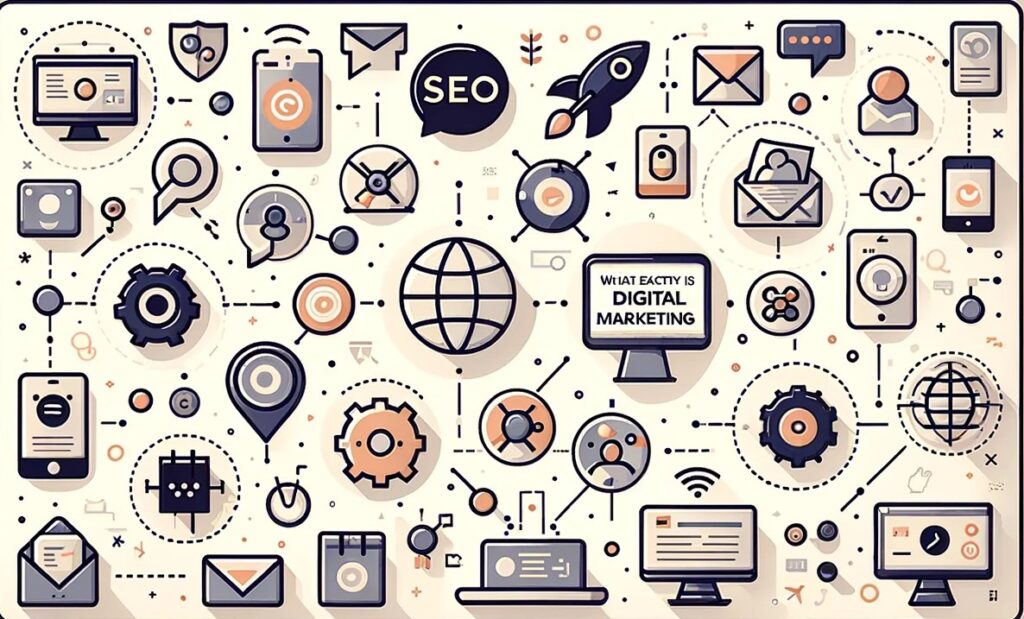In the evolving landscape of business and commerce Digital marketing has emerged as a cornerstone of modern strategy. It’s a term that buzzes around every corner of the corporate world, but what does it mean? Let’s dive into the realm of digital marketing, a phenomenon that has reshaped the way businesses interact with their customers.
Understanding Digital Marketing
Digital marketing is the promotion of products or services using digital channels to reach consumers. This broad term includes not only internet-based platforms like search engines, social media, email, and websites but also encompasses marketing through digital devices like TVs and radios.
Why Digital Marketing is Essential
In today’s digital age, digital marketing is crucial for business growth and brand awareness. It’s become a staple in consumer lives, with most brands maintaining some form of digital presence, whether through websites, social media, or digital advertising. The versatility and accessibility of digital content have made it a fundamental part of consumers’ decision-making processes.
Advantages of Digital Marketing

- Global and Local Reach: Digital marketing offers an immense reach, transcending geographical boundaries. This accessibility allows even small businesses to reach international audiences, a feat that would be costly and complex with traditional marketing. It also significantly enhances local visibility, crucial for businesses depending on local clientele.
- Cost-Effectiveness: Compared to traditional marketing methods, digital marketing is more affordable and offers highly targeted strategies. It provides cost-effective solutions for both local and international promotion, making it accessible to businesses of all sizes.
- Brand Awareness and Engagement: It is instrumental in building brand recognition and awareness. Moreover, digital marketing is inherently engaging, encouraging user interaction through various online platforms. This increased engagement helps in converting casual traffic into loyal customers.
- Effective Targeting and Personalization: Digital marketing allows businesses to target their audience more precisely and adapt their strategies to customer behavior and preferences. This targeted approach ensures that marketing efforts are not wasted on uninterested parties.
- Measurable and Adaptable: One of the key strengths of digital marketing is its measurability. Businesses can track and analyze the performance of their campaigns in real time, allowing for quick adaptation and optimization for better results.
- Increased ROI: Digital marketing strategies, when executed well, can lead to a higher return on investment. This is due to their ability to target more precisely and engage customers more effectively than traditional marketing methods.
- Diverse Content and A/B Testing: The digital space offers a variety of content types, allowing businesses to keep their branding fresh and engaging. Additionally, techniques like A/B testing provide insights into what strategies work best, enabling continuous refinement of marketing efforts.
- Customer Experience and Retention: Digital marketing enhances customer experience and fosters a sense of community among consumers. By addressing customer needs and feedback promptly, businesses can build a loyal customer base and improve overall sales.
A Future-Proof Strategy
The world of digital marketing is vast, and its importance continues to grow in a digitally connected world. Analysts predict that the global digital advertising and marketing sector will reach $786.2 billion by 2026, highlighting the increasing reliance on digital strategies. Whether it’s through SEO, PPC, social media, or content marketing, digital marketing offers a multitude of avenues for businesses to connect with their audience and thrive in today’s competitive marketplace.
Conclusion
Digital marketing, in its essence, is about reaching the right audience at the right time and place. It’s a multifaceted approach that aligns with the modern consumer’s digital journey. By harnessing the power of digital channels, businesses can not only survive but thrive in the ever-evolving digital landscape.